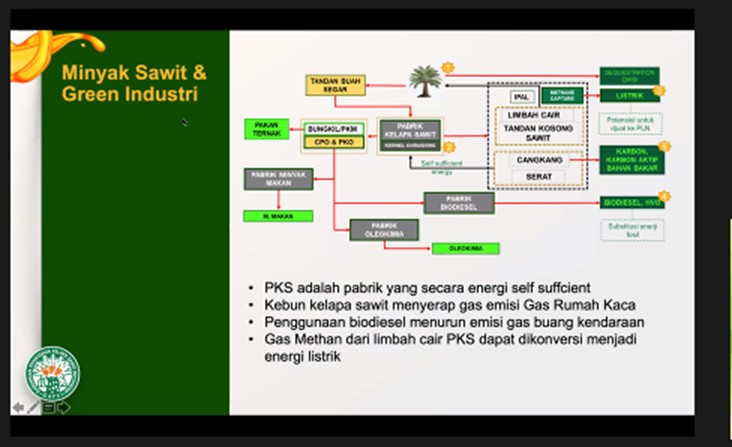Palm Oil Industry as the Key to the National Economic Growth
By Adi Permana
Editor Adi Permana

BANDUNG, itb.ac.id – SITH (School of Life Sciences and Technology) ITB’s Biomanagement Master's Study Program held a guest lecture about the role of palm oil industries in Indonesia’s economic growth. The session on Thursday (24/2/2022) was presented by Togar Sitanggang (Vice Chairman III of Trade and Sustainability Affairs from the Palm Oil Entrepreneurs Association of Indonesia) and Mukti Sardjono (Senior Advisor of the Minister of Agriculture).
The class was titled "Strategies in Business Development and Risk Management of Palm Oil Industries as the Driving Force of the National Economic Growth".
Mukti began his presentation by listing the factors that affect the operation of palm oil industries. "Palm oil production in countries that act as producers will be affected by their weather, climate, export taxes, and regulations. On the contrary, the demand for palm oil in consumer countries is influenced by their population, economic growth, energy consumption, politics, lifestyle, and public health," Mukti explained.
Management of palm oil industries also depends on their business competitors, in which their products compete with others based on vegetable oil. Since the price of palm oil in Indonesia relies on the global market, its sale will heavily impact the income and expenditure of local farmers and consumers respectively. On the other hand, Indonesia dedicated large areas of land to cultivate palm oil; thus, it is statistically the biggest palm oil producer and exporter, owning the 6th largest palm oil site in the world.
With the sector’s massive profit and abundance in supply, Indonesia has multitudes of opportunities to expand palm oil as the nation’s leading foreign exchange product. Moreover, the oil itself is a natural resource rich in benefits. "Not only can it be used as cooking oil, but it can also be used to make margarine, glycerin, hand sanitizer, and biodiesel. Its waste can be reused to create other products," Togar illustrated.

Palm oil- in its raw and processed form- is a good absorber of greenhouse gases. Despite some greenhouse gases like methane being generated during the industry's wastewater treatment, they can be converted into a source of electricity. "Replacing 1 liter of diesel with biodiesel can reduce 2.65kg emissions of CO2Eq. In fact, using biodiesel in 2021 has reduced emissions by 22.4 million tons of CO2Eq," Mukti stated.
In the economic aspect, palm oil industries increase job opportunities and foreign exchange markets, in which 10,000 hectares of palm oil plantations and industries hired 2,600 non-graduates and 25 fresh graduates. The employment is carried out in different divisions, starting from engineering, logistics, security, agricultural harvesting, chemical and fertilizer production, refinery, biodiesel manufacture, to hazardous waste treatment.
Throughout 2021, Indonesia has earned 35.5 million US dollars in the foreign exchange market solely from palm oil with revenues from applied taxes. This can save Indonesia’s trading balance from deficiency. Aside from providing foreign exchange funds, palm oil supplies the people’s domestic needs in food, oleochemical, and biodiesel. Considering the amount of palm oil spent in the country, its availability for export is still considerably many.
Albeit its success, the palm oil sector in Indonesia is still facing several challenges. One of them is its productivity which has yet to reach its optimum due to its development performed on high-risk lands; hence, operational research of the site needs to be done. In terms of infrastructure and accommodation, expensive shipping fees and time-consuming distribution procedures are ever-growing problems in the industry. These lead to an increase in accommodation expenses because of the long, demanding waiting time for production to reach the refinery stage.
On the bright side, there are various strategies designed to overcome these issues. "First, biodiesel production must be flexible to regulate exported goods. In addition, failed crops can be rejuvenated whereas both cultivation and processing techniques are improved. The productivity and efficiency of the industry can be enhanced while maintaining its production costs. Lastly, waste and facilities of the palm oil industry must be managed well, " Togar suggested.
Reporter: Yoel Enrico Meiliano (Food Engineering, 2020)
Translator: Ruth Nathania (Environmental Engineering, 2019)

.jpg)
.jpg)


.jpg)
